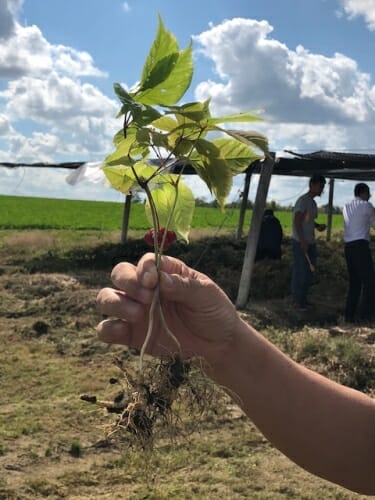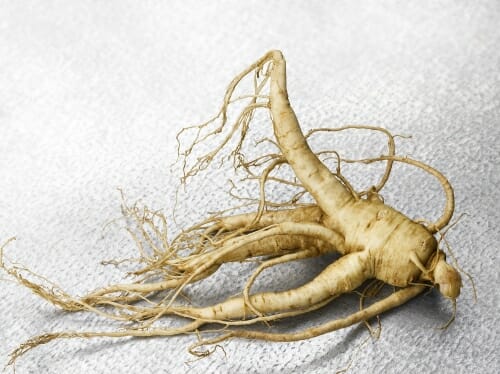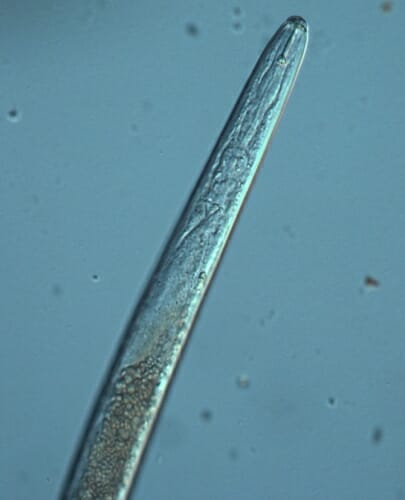As ginseng growers in Wisconsin prepare to export fresh ginseng roots to Taiwan, they need assurance that the roots will not carry a harmful nematode that could infect Taiwan’s banana crop.
Nematodes are a broad phylum of soil-dwelling animals that includes some important plant pests. Taiwan is concerned about Radopholus similis, a voracious nematode that occurs in Florida and other warm climates, says Ann MacGuidwin, a professor in plant pathology, in the College of Agricultural and Life Sciences.

Although most nematodes are beneficial, “R similis is an example of a plant pathogen that is incredibly well adapted to living in soil and is highly persistent,” MacGuidwin says. “You get one chance before planting to deal with soil pathogens. During the three or four years that ginseng is growing, whatever was there at the start will plague the crop for the duration.”
MacGuidwin, a “card-carrying” nematode expert and professor of plant pathology at UW–Madison, says the concern is logical. Even though the half-millimeter long nematode in question is native to tropical regions and unlikely to survive in Wisconsin, once established in fields, it’s extremely hard to eradicate.
Ginseng, a high-value crop in central Wisconsin, is used in Chinese medicine to either “warm” the body, or, as with the Wisconsin species, to “cool” it.
“Wisconsin ginseng has the reputation for the best quality in the world,” says Jackie Fett, executive and marketing director of the Ginseng Board of Wisconsin, “and Wisconsin account for about 90 to 95 percent of all ginseng produced in the country.”

Marathon County alone produces about 95 percent of Wisconsin’s annual crop, which totaled about 1 million pounds of ginseng in 2018.
“It is both extremely helpful and necessary to have Dr. Ann MacGuidwin’s involvement in the fresh ginseng to Taiwan project,” says Fett. Her knowledge and expertise are invaluable to this project. We are very appreciative and grateful for her support and involvement.”
MacGuidwin says the Wisconsin Ginseng Board came to her to explore ways to assure Taiwan that the fresh roots would contain none of the R similis.
“It’s a huge market, because Taiwan does not grow its own ginseng, and you can do everything with fresh ginseng that you can with dried root,” MacGuidwin says. “The nematode Is a make-or-break issue for the proposed export expansion.”
Nematodes are a huge phylum and many species remain to be discovered, MacGuidwin says. “People estimate that if you counted heads, nine in 10 animals are nematodes. Many nematodes in healthy soil play roles in decomposition and nutrient recycling. Some nematodes parasitize insects while most feed on bacteria.”
One bacteria-feeding species, called C elegans, is a model organism studied in biology labs around the world.
MacGuidwin says her specialty, detrimental nematodes, “are a very small minority,” but notes that in Wisconsin, a genus commonly called root lesion nematode, does cause yield losses. “As Wisconsin’s only expert on harmful nematodes, over the years I have conducted research on nematodes associated with cranberry, cherry, potato, carrot, soybean, mint, pea, and corn. I have worked on virtually every crop in the state.”
To ensure that fields are free of R. similis, MacGuidwin is working with colleagues from the Animal and Plant Health inspection Service at the U.S. Department of Agriculture, and regulators at the Wisconsin Department of Agriculture, Trade and Consumer Protection, to develop a protocol for sampling soil to confirm the absence of the unwanted nematode. “The state has ceded power to my lab to do the detection,” says MacGuidwin. “I will be the one that verifies that a field is free of the pest.”
The protocol now being developed will detail how much soil sampling will be required, and how the samples will be examined under the microscope. “For fresh-root exports, they will have to do this for every shipment,” MacGuidwin says. All ginseng entering Taiwan must originate in a certified field.
The fresh roots themselves, MacGuidwin says, “are very white, clean, and this nematode would make a dark lesion, which would be caught by inspections at the washing facility.”
As agricultural regulators, ginseng growers and MacGuidwin work out the details needed to permit the industry to expand exports, UW–Madison chancellor Rebecca Blank visited ginseng grower (and UW–Madison alumnus) Will Hsu near Wausau on Feb. 1.
“These collaborations are a good example of the ways in which UW–Madison expertise benefits Wisconsin’s citizens and helps to grow this state’s economy,” Blank said. “Detailed knowledge about how to prevent and control plant pathogens and diseases is extraordinarily important to Wisconsin’s growers, which is why plant pathologists like Professor MacGuidwin have long played an essential role in efforts to expand the markets for Wisconsin-grown products.”
MacGuidwin studies nematodes from a scientific as well as an economic standpoint. In terms of the exports to Taiwan, she says, “Proving a negative, proving that there are no R similis nematodes in a field, is difficult,” especially for a microscopic organism. “But there is zero tolerance. For Taiwan, there is no acceptable number of these nematodes; one is too many. We have to take this seriously, because the repercussions are so serious.”
David Tenenbaum | University Communications

